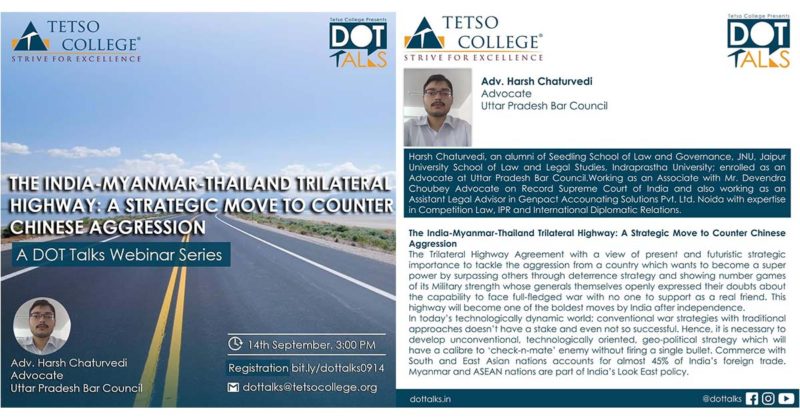The India-Myanmar-Thailand Trilateral Highway: A Strategic Move to Counter Chinese Aggression
The Trilateral Highway Agreement with a view of present and futuristic strategic importance to tackle the aggression from a country which wants to become a super power by surpassing others through deterrence strategy and showing number games of its Military strength whose generals themselves openly expressed their doubts about the capability to face full-fledged war with no one to support as a real friend. This highway will become one of the boldest moves by India after independence.
In today’s technologically dynamic world; conventional war strategies with traditional approaches don’t have a stake and are even not so successful. Hence, it is necessary to develop unconventional, technologically oriented, geo-political strategy which will have a calibre to ‘check-n-mate’ enemy without firing a single bullet. Commerce with South and East Asian nations accounts for almost 45% of India’s foreign trade. Myanmar and ASEAN nations are part of India’s Look East policy. India is part of BIMSTEC, East Asia Summit, Mekong-Ganga Cooperation, United Nations Economic and Social Commission for Asia and the Pacific, Asian Highway Network and the Trans-Asian Railway network and India has embarked on several Look-East connectivity projects.
The trilateral highway will connect Moreh, India with Mae Sot, Thailand via Myanmar. It is a part of India’s Look East Policy that will cultivate and strengthen economic and strategic relations with the nations of Southeast Asian countries in order to solidify its standing as a regional power. This project will help Indian position as a counterweight to the strategic influence of the People’s Republic of China in the region and suppressing weak countries under its number game deterrence. A Motor Vehicles Agreement along with protocols for regulating and facilitating movement of cargo and passenger vehicular traffic is under inter-governmental negotiations between India, Myanmar and Thailand. The National Highways Authority of India (NHAI) has been appointed as the technical executing agency and project management consultant. It will be a four-lane highway which is approximately 1,360 km (850 mi). India–Myanmar Friendship Road, linking Moreh-Tamu-Kalemyo-Kalewa was built by the Border Roads Organisation (BRO) which is now forming a part of the trilateral highway. Other Countries like Indonesia, Laos, Cambodia, Philippines and most surprisingly Taiwan also wants to join hand and shown their interest in this agreement as India has opened this agreement for new partners and they are even ready to give berthing rights to Indian Navy and infrastructure establishing rights to Indian Air Force and Indian Army, even South Korea and Japan
wants to establish a permanent sea-road link under this agreement. This project will boost trade and commerce in the ASEAN–India Free Trade Area, as well as with the rest of Southeast Asia and most importantly it will create a humongous barrier for China to execute its geo-strategic interests and policies. This is one of the smartest and visionary moves that the Government of India has ever made to check the expansionist and imperial ambitions of China.
Harsh Chaturvedi, an alumni of Seedling School of Law and Governance, JNU, Jaipur University School of Law and Legal Studies, Indraprastha University; enrolled as an Advocate at Uttar Pradesh Bar Council. Working as an Associate with Mr. Devendra Choubey Advocate on Record Supreme Court of India and also working as an Assistant Legal Advisor in Genpact Accounting Solutions Pvt. Ltd. Noida with expertise in Competition Law, IPR and International Diplomatic Relations. He is also an international speaker having delivered lectures widely on various public and academic platforms including University of Ottawa, Faculty of Law.
Date: 14th September 2020
Time: 3:00 PM
Registration: bit.ly/dottalks0914

